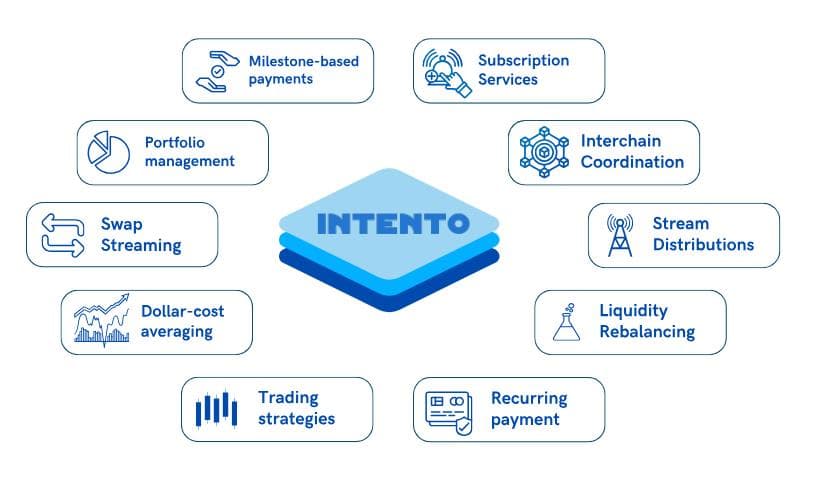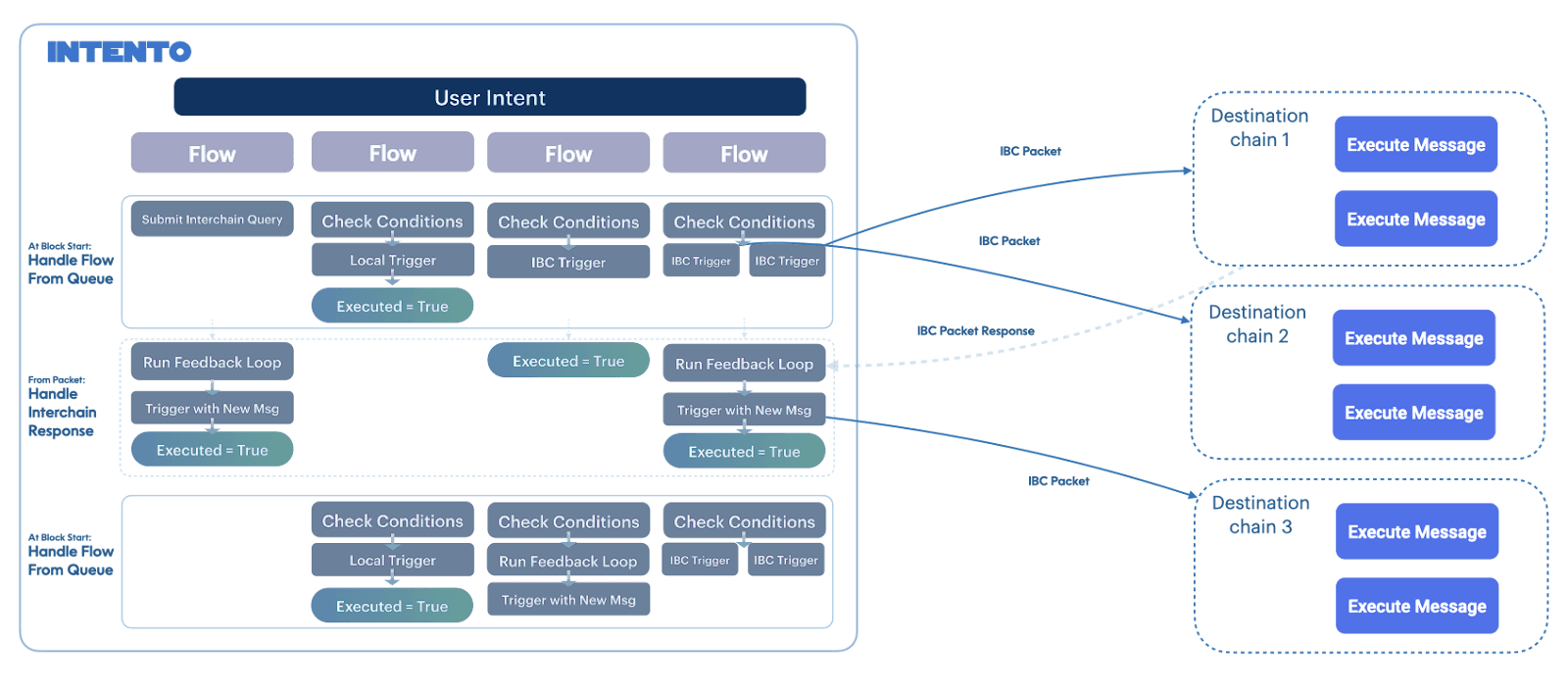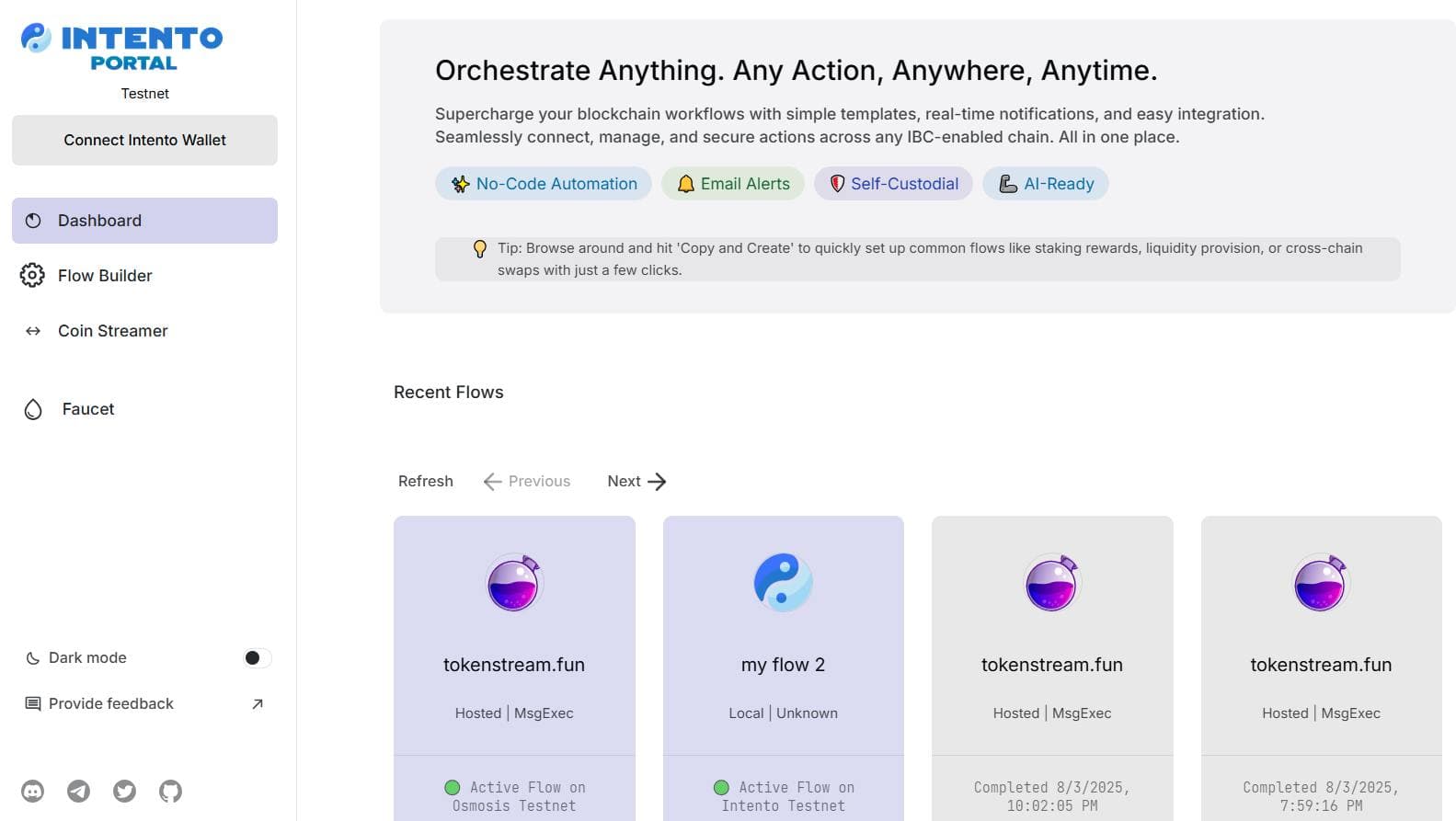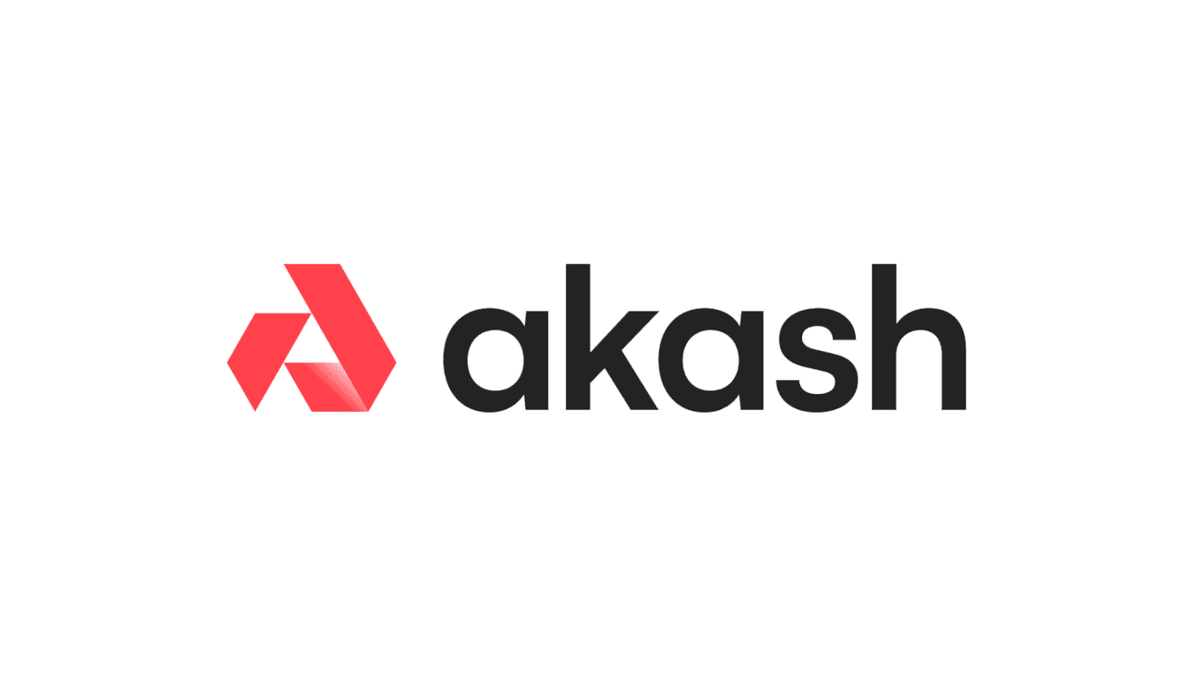The evolution of blockchain technology has been a story of increasing complexity. We moved from simple peer-to-peer transactions to a diverse multi-chain setup in the form of decentralized finance (DeFi), complex governance systems, and further innovations in digital assets. Executing multi-step, condition-based objectives is a complex process, frequently requiring cross-chain communications, and relies on a wide variety of intermediary contracts and vulnerable bridges. Intento is the protocol designed to provide a secure infrastructure layer to orchestrate these complex actions across blockchains for both people and AI agents.
Key Takeaways
- Intento simplifies cross-chain automation, allowing for complex workflows to be configured without writing smart contracts.
- It allows overcoming the core drawbacks of existing automation, including the high fees and the inherent security risks of custom contracts.
- A core principle is self-custodial execution, ensuring users retain full ownership and control of their assets.
- The native interoperability allows for direct cross-chain actions, eliminating the security vulnerabilities associated with third-party bridges.
- Automation becomes dynamic by using live on-chain data to trigger actions, enabling conditional execution based on real-time events.
Intento: A New Standard for Intent-Based Execution
Modern efforts at automating on-chain activities fall into several inefficient and dangerous categories. Decentralized execution by bot networks, for example, creates a competitive space where several competitors, all bots, compete to make the same transactions, and thus congest the network, resulting in higher fees for everyone. As such, this mechanism naturally leans towards centralization, putting smaller providers at a great economic disadvantage.
The alternative, using custom smart contracts, is no silver bullet. Development of smart contracts specific to every particular-in-place use case remains a time-consuming and vastly complex process requiring niche technical skills. This approach is also risky, as even minor coding errors can lead to serious security flaws. For instance, the recent report describes how a team of researchers created an AI agent program that can automatically identify and exploit vulnerabilities in Solidity smart contracts. This creates a troubling asymmetry that favors attackers, making the reliance on custom smart contract logic more dangerous than ever. Besides these security threats, deploying and managing such contracts within different blockchains remains a technologically fragmented and practical challenge.
Intento, a decentralized protocol created by TRST Labs, aims to solve this problem. It supports intent-based execution by using "flows," thus allowing the orchestration of operations on any IBC-connected chain without custom smart contracts. The overall goal of the protocol is to reduce transactional complexity and to give users permissionless, self-custodial control.

By moving the execution logic from complex, application-specific contracts to a dedicated and standardized chain, Intento provides a more secure, efficient, and scalable solution.
The Architectural Principles of Intento
The architectural principles of Intento are grounded in the strategic choice to build a purpose-built chain rather than a general-purpose one. The protocol is built using the Cosmos SDK, a framework that allows for the creation of customized, application-specific blockchains. This decision allows Intento to move beyond the limitations of smart contract platforms and create a unique and highly reliable execution model. To ensure actions are carried out reliably, all automated "flows" are placed in an on-chain queue. At the beginning of each block, a custom function checks this queue to execute any scheduled tasks. This design choice ensures that even if the chain were to halt temporarily, the queued actions would resume automatically in subsequent blocks, providing exceptional reliability and continuity.
Dynamic, Cross-Chain Capabilities
Intento is built for a multi-chain world. The system leverages the Inter-Blockchain Communication (IBC) protocol, along with Interchain Accounts (ICA) and Interchain Queries (ICQ), to facilitate secure cross-chain workflows. This native interoperability is what allows Intento to execute actions on other chains without a user's assets ever leaving their control, eliminating the need for risky third-party bridges.

Furthermore, these workflows are not static, they can be dynamic and responsive. By using Interchain Queries, a flow can pull real-time data from another blockchain to validate conditions before executing an action. This enables adaptive automation with powerful feedback loops that can refine processes over time, such as checking a token's price on a DEX before executing a swap.
A Secure Foundation for the Future
Security is the cornerstone of the entire design. Rather than bootstrapping its own validator set, Intento operates as a consumer chain utilizing Interchain Security (ICS) from the Cosmos Hub. This allows it to inherit the economic security and high level of decentralization of the Hub’s powerful validator set from day one.
This architecture provides the perfect foundation for the next frontier: AI-driven orchestration. Intento enables a safe and practical framework for AI agents to operate in DeFi. An agent can observe on-chain activity or infer user intent, then construct and propose a transaction flow through the Intento Portal. The user receives this proposal, reviews it, and provides the final, explicit approval by signing the transaction with their own wallet. This separates intent recognition from execution, allowing AI to automate the tedious parts while the user always holds the keys. What’s more, Intento’s system can handle up to 200 million actions per hour, giving AI agents the speed and reliability to scale their workflows without bottlenecks.
Automating DeFi and More with the Intento Portal
Intento is not just a theoretical protocol, it is a real platform for end-users and developers to create and execute on-chain automation effortlessly. The main entry point for users is the Intento Portal, an all-in-one solution for creating, managing, and monitoring self-custodial workflows.

The Portal is built for ease of use, featuring a "Copy and Create" function that allows users to quickly set up common flows like staking rewards or cross-chain swaps with just a few clicks. It also includes a notification service to keep users informed about the status of their flows, such as when a task executes or fails.
Furthermore, the “Intento Portal Submit” feature simplifies this process immensely by allowing any dApp to trigger a pre-filled submission page for a flow using just a single URL, guiding the user through the final inputs securely and efficiently.
This accessible front-end enables a vast range of high-value use cases, including:
- LP & Yield Optimization: Users can automatically diversify LP rewards, dynamically shift funds to higher-yielding pools based on APY, and rebalance positions to mitigate impermanent loss.
- Advanced Trading Strategies: The platform supports executing DCA and limit orders based on specific price conditions rather than manual timing. It also enables users to conduct large trades over time using swap streaming to minimize slippage.
- Automated Loan Management: Flows can be configured to prevent liquidation risks by automatically repaying loans when certain collateral health factors are met.
- Treasury and Payment Orchestration: DAOs and businesses can automate payroll, schedule fund transfers, and manage recurring NFT-based subscriptions securely.
For developers and dApps looking to integrate this functionality, the Intento Integration Hub offers a public repository of examples and client scripts to plug powerful automation directly into their user experiences.
The ecosystem continues to expand with new tools like the tokenstream.fun, an application that allows users to visually compose and monitor token streams with embedded logic. These tools demonstrate how Intento’s powerful and flexible architecture serves as a foundation for a new generation of user-friendly, automated dApps.
Conclusion: The Future of Automation is Intent-Driven
Intento provides foundational infrastructure designed to unleash a whole new generation of decentralized apps. It offers a generalized, secure, and user-managed execution layer where developers can create advanced cross-chain applications and enable users to engage with Web3 and DeFi in an intuitive and flexible way.
To fully understand how powerful this new paradigm is, you need to experience it for yourself. To encourage community participation and battle-test the network, the Intento public testnet is currently live. The team has also launched the Intento Testnet Points Program, which rewards meaningful contributions with a share of 1.5% of the total token supply. With rewards for verified testnet use, now is the perfect time to get involved and help shape the future of intent-based automation.
The shift from isolated, independent transactions to fluid, intent-driven flows is an important move towards speeding up the development of the blockchain ecosystem. Intento is laying the groundwork for this future, setting a new standard for how our intentions are seamlessly and securely realized on-chain.
The information provided by DAIC, including but not limited to research, analysis, data, or other content, is offered solely for informational purposes and does not constitute investment advice, financial advice, trading advice, or any other type of advice. DAIC does not recommend the purchase, sale, or holding of any cryptocurrency or other investment.


